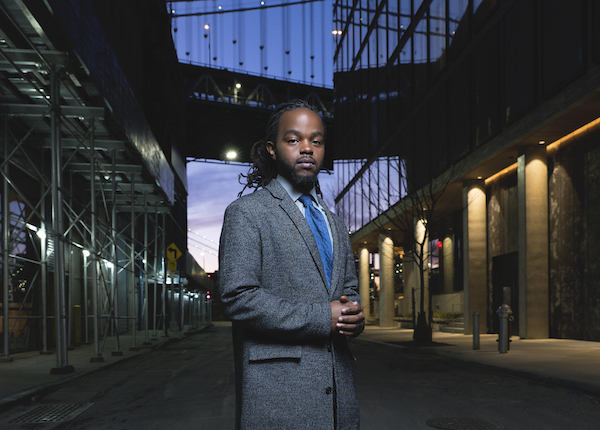Jan 13, 2026 2:09 PM
More Trump-Kennedy Center Cancellations
The fallout from the renaming of the John F. Kennedy Center for the Performing Arts to include President Donald…

Victor Gould experiments with new voices and longstanding collaborators on Thoughts Become Things.
(Photo: Jimmy Katz)“Start as a sideman and prove yourself.”
Those words churned in Victor Gould’s mind as he left Los Angeles for New York in 2011. Gleaning tips from the biographies of Herbie Hancock and other prominent jazz figures, the pianist-composer was on the road, seeking opportunities to play with leaders he admired—who’d appreciate his personal contributions to their projects.
“I’ve taken a lot of time to be a sideman,” said Gould, who’s spent the past several years touring with a diverse group of bandleaders, including trumpeter Jeremy Pelt and vocalist-composer Jazzmeia Horn. This year, though, he’s ready to lead his own international tours.
New York clubgoers have known Gould’s sound for years: the lilt of his lines over a ballad intro and the warm pulses he finds and sits inside of. Thoughts Become Things (Blue Room)—his third recording as a leader—finds Gould poised to garner acclaim beyond the tight circle of artists and listeners who have appreciated his sound for the past decade.
“It all comes down to the triplet; swing music is kind of based on that,” he said, “It goes hand-in-hand: swing and triplet feel, African 6/8 rhythms—Abakuá rhythms.”
Gould’s compositional style identifies connections among music, culture and life experiences. When composing “Inheritance,” a tune off Thoughts, he allowed a single idea to inform the movement of the entire piece. “My first thought for that song was Africa,” he said. “And when I think Africa, I think triplets—6/8. It’s kind of ‘misplaced’ triplets. It doesn’t sound like a 6/8 groove, but it is a 6/8 African groove.”
Interactivity inspires the bandleader, too, as a player and a writer. His compositions, though thoughtfully arranged, leave plenty of room for exploration. Listeners and fellow artists might note a sensitivity in Gould’s expression, and while he questions that descriptor’s association with timidity, he considers the concept of sensitive playing: “[For this recording,] I wanted to leave a lot of room to improvise. And sensitivity is a big part of making that work. Making music spontaneously, all of us had to be sensitive to each other’s inflections and to everything that we hear.”
Thoughts features contributions from a full string quartet and an array of soloists—Pelt and tenor saxophonist Dayna Stephens among them—who help interpret the depth and texture of Gould’s arrangements. Flutist Anne Drummond also appears on the recording. She’d joined the pianist on 2016’s Clockwork (Fresh Sound New Talent), but for the new album, he sought to feature her more integrally.
Because he’d grown up listening to his flutist father’s record collection—Hubert Laws, James Moody, Frank Wess and Yusef Lateef—Gould admitted he always has flute lines playing in his mind.
“I wanted to be as natural as possible,” he said, “to convey the purest melody in my head, exactly the way I was hearing it. And if I’m honest, probably I’m always hearing flute. Anything else would just be trying to imitate the flute.”

Belá Fleck during an interview with Fredrika Whitfield on CNN.
Jan 13, 2026 2:09 PM
The fallout from the renaming of the John F. Kennedy Center for the Performing Arts to include President Donald…

Peplowski first came to prominence in legacy swing bands, including the final iteration of the Benny Goodman Orchestra, before beginning a solo career in the late 1980s.
Feb 3, 2026 12:10 AM
Ken Peplowski, a clarinetist and tenor saxophonist who straddled the worlds of traditional and modern jazz, died Feb. 2…

The success of Oregon’s first album, 1971’s Music Of Another Present Era, allowed Towner to establish a solo career.
Jan 19, 2026 5:02 PM
Ralph Towner, a guitarist and composer who blended multiple genres, including jazz — and throughout them all remained…

Rico’s Anti-Microbial Instrument Swab
Jan 19, 2026 2:48 PM
With this year’s NAMM Show right around the corner, we can look forward to plenty of new and innovative instruments…

Richie Beirach was particularly renowned for his approach to chromatic harmony, which he used to improvise reharmonizations of originals and standards.
Jan 27, 2026 11:19 AM
Richie Beirach, a pianist and composer who channeled a knowledge of modern classical music into his jazz practice,…